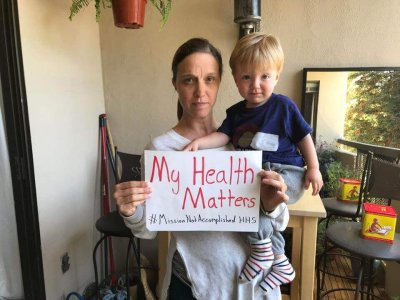I am so honored to work with the #MEAction community on a daily basis. Our organization is fighting hard everyday to communicate the truth about myalgic encephalomyelitis (ME) – to shout it out loud and clear – to the world. My role as the #MEAction Editor & Communications Manager is to support, guide and spearhead this work. Day-in and day-out, we are telling the story of ME to our health officials and medical providers, we are talking to our legislators and the press, we are educating our family and friends.
Our story is momentous, painful and complex, and deserves to be heard. For far too long, a false and damaging narrative has been repeated about ME based on ignorance and stigma. We have been told there is nothing wrong with us – that we are simply stressed out, depressed or bored and that it’s nothing a little exercise and talk therapy won’t cure. Medical providers continue to toss us into these catch-all buckets because they don’t have the diagnostic tools or knowledge to tackle the complex disease that is actually ravaging our community.
This ongoing dismissal and lack of interest from our healthcare officials and medical providers has blocked our access to a timely diagnosis, appropriate treatments and humane care. Doctors turn us away empty-handed or, worse, prescribe treatments that have worsened us significantly. Most horrifically, health officials have gaslighted our children into psychiatric wards claiming that parents no longer have the agency to understand or care for their own children. Extremely ill with ME, these children have been abused and neglected under the blind belief that they could stop being ill if only they wanted to.
This is not my first rodeo. When I was 26-years-old, I had sudden and inexplicable symptoms. It took several months to get a diagnosis but, ultimately, the system worked as it should. Severe neurological pain sent me to the emergency room where I was referred to a neurologist who – through blood work and an MRI – diagnosed me with an aggressive pituitary tumor. It was frightening, but I had a team of specialists treating me, and the pathway was clear. Over a period of four years, I underwent two surgeries and radiation to successfully remove the tumor. My neurologist worked closely with me throughout to help mitigate the difficult migraine symptoms so that I was able to continue working full-time and enjoying an active life.
Four years later, I was unlucky enough to develop sudden and inexplicable symptoms following radiation to my brain, and returned to the very same specialists at UCSF – one of the top hospitals in the US – for help. Over the course of months, I returned to them again and again, hoping that if I just explained the symptoms a little better, if I presented a well-designed spreadsheet detailing before-and-after symptoms, if I brought along my husband and my father, they would finally understand the problem and work to find a solution. I must not be conveying the seriousness of the situation clearly enough, I thought. The doctors issued blood tests but everything came back fine. My endocrinologist shrugged it off. The tumor was fine; standard blood work was fine. He referred me back to my PCP who, also, did not seem particularly interested in my sudden, rapid decline in health, and suggested I might be depressed. Of course, I was desperate and tear-choked during those appointments. My health had tanked overnight. I could no longer work. I was in horrible pain and could only handle small bouts of exertion before having to return to bed to recover. I knew that depression is a serious and crippling disease, but this was not it. I was stumped that none of the world-renowned specialists seemed particularly interested in investigating further. I had just turned 30-years-old.
My family and I settled on the fact that it must have been effects from the radiation, and I resigned myself to spending most of the day in bed unable to participate in so many facets of life. After a year of not improving at all, a friend suggested my symptoms sounded familiar to her friend who had chronic fatigue syndrome.
(Following an outbreak of ME in Lake Tahoe in the mid-’80s, the CDC began calling the disease “chronic fatigue syndrome;” researchers and federal agencies now typically call it ME/CFS. The patient community often calls it ME so not to minimize the severity of the disease whose hallmark symptom is post-exertional malaise – difficulty recovering from exertion as minor as taking a shower or having a conversation. For severe patients, for example, it may take weeks to return to “baseline” after a 15-minute visit from a friend.)
I brushed off her comment. I did not need another disease. Three months later, I was in Dr. David Kaufman’s office sitting across from his desk having a long, detailed conversation about my health history and symptoms. I fit the ICC criteria for ME, and 26 vials of blood later revealed many of the abnormalities seen in ME patients – high viral loads, low NK cell counts, IGG deficiencies, gut dysfunction (SIBO) and methylation issues. I left the appointment elated that we might finally find something specific that could be fixed.
Five years later, I am still one of the lucky patients who sees Dr. Kaufman (he no longer has the capacity to see new patients), and I continue to leave every appointment elated that a real investigation is underway that may restore even more of my functionality. I am also one of the lucky patients who have responded well to his treatments – antivirals, methylated B12 and folate supplements, SIBO treatments and MCAS treatments.
And, yet, there are only about a dozen ME specialists like Dr. Kaufman across the United States, many of whom have long waitlists, are nearing retirement and who do not take health insurance (because the process of getting reimbursed for ME is so impossible). And, as compassionate and knowledgeable about ME that Dr. Kaufman is, his treatments are still experimental and hit-and-miss for a lot of patients because there is just not enough research for him to go by. As another patient put it, “Some things work for some people for some of the time.”
My story is a needle in the haystack of stories about misdiagnosis and a lack of concern and curiosity within the medical field about ME. I never could have imagined that doctors could be so uninterested or dismissive of a patient’s report of serious, persistent health symptoms. But, the fault cannot lie with each doctor alone who has not been given the tools or expertise to tackle the problem when only 6 percent of medical schools teach about ME. A systematic shift must take place within the medical field in order to equip doctors with the tools to diagnose and care for people with ME. Our governments cannot continue to ignore such a debilitating and widespread disease by failing to educate doctors or invest in research to understand the disease. (An estimated 1 to 2.5 million Americans, and 15-30 million people worldwide have ME).
This is why I am so proud to work for #MEAction, which is telling our story of ME to the world, and fighting for governments to create health systems that are responsive, accessible and compassionate to people with ME. Please support our work in building this movement.
By the end of June, our goal is to raise $100,000 in the US and £10,000 in the UK. I am asking you to donate to #MEAction today to keep this work going. We are at $40,229 in the US and £8,920 in the UK.
[maxbutton id=”17″ url=”https://give.meaction.net/millionsmissing-us/adriane-tillman” text=”Donate to #MEAction” ]






1 thought on “Why the Fight is Personal”
Thank you so very much for speaking out and for the work you do for our cause.
It is important to remember that our doctors need the tools and training to enable them to better understand ME and to give appropriate treatments.
Yes, your health matters and I pray that your sweet little one will get to see his courageous mom healed. Soon! Love and Light to you and your family.
Marianne
Comments are closed.